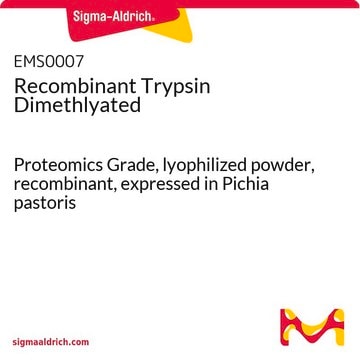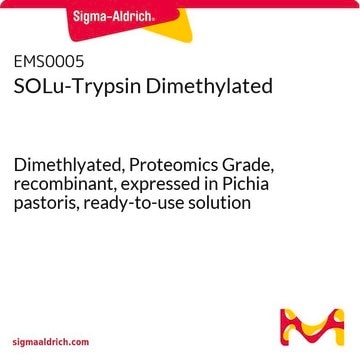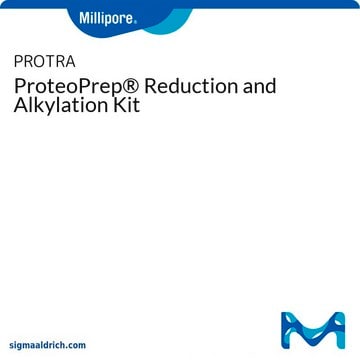T7575
Trypsin Singles, Proteomics Grade
Sinonimo/i:
Proteomics grade, Trypsin, TPCK treated
Autenticatiper visualizzare i prezzi riservati alla tua organizzazione & contrattuali
About This Item
Codice UNSPSC:
12352204
NACRES:
NA.56
Prodotti consigliati
Grado
Proteomics Grade
Stato
ready-to-use solution
Attività specifica
≥10,000 BAEE units/mg protein
PM
average mol wt 23.29 kDa
pH ottimale
~8.0
Temperatura di conservazione
2-8°C
Descrizione generale
Experience all of the advantages of Proteomics Grade Trypsin in a convenient, single-use 1 μg package.
Trypsin Singles, Proteomics Grade exhibit excellent proteolytic efficiency, generating more tryptic peptides leading to greater sequence coverage of your peptide of interest. Mass spectra are significantly simplified due to the reduced number of interfering autolytic peaks and their ambiguous adducts. Proteomics Grade Trypsin has been extensively purified from porcine pancreas to enable accurate and precise cleavage on the carboxylic side of Arg and Lys residues. The enzyme has been exhaustively processed by reductive methylation to minimize autolysis and chymotryptic activity has been quenched by TPCK treatment. Further purification steps including affinity chromatography and drying from dilute acid produce a highly purified, high specific activity trypsin purposely suited for the demanding criteria of proteomics research, and designed to function in either solution or gel-based digests.
Trypsin Singles, Proteomics Grade exhibit excellent proteolytic efficiency, generating more tryptic peptides leading to greater sequence coverage of your peptide of interest. Mass spectra are significantly simplified due to the reduced number of interfering autolytic peaks and their ambiguous adducts. Proteomics Grade Trypsin has been extensively purified from porcine pancreas to enable accurate and precise cleavage on the carboxylic side of Arg and Lys residues. The enzyme has been exhaustively processed by reductive methylation to minimize autolysis and chymotryptic activity has been quenched by TPCK treatment. Further purification steps including affinity chromatography and drying from dilute acid produce a highly purified, high specific activity trypsin purposely suited for the demanding criteria of proteomics research, and designed to function in either solution or gel-based digests.
Applicazioni
Trypsin Singles, Proteomics Grade have been used for protein digestion to analyse generated peptides via MALDI-TOF MS (matrix assisted laser desorption ionization-time of flight mass spectrometry). It has been used for the digestion of proteins to analyse generated peptides via LC-MS (liquid chromatography–mass spectrometry)/MS.
Caratteristiche e vantaggi
- Convenient, single-use 1 μg size
- Eliminates repetitive pipetting
- Reductively methylated to minimize autolytic activity
- TPCK treated to quench chymotryptic activity
- Extensively purified
Prodotti correlati
N° Catalogo
Descrizione
Determinazione del prezzo
Avvertenze
Danger
Indicazioni di pericolo
Consigli di prudenza
Classi di pericolo
Acute Tox. 4 Dermal - Acute Tox. 4 Inhalation - Acute Tox. 4 Oral - Eye Irrit. 2 - Flam. Liq. 2 - Resp. Sens. 1 - Skin Irrit. 2 - STOT SE 3
Organi bersaglio
Respiratory system
Codice della classe di stoccaggio
3 - Flammable liquids
Scegli una delle versioni più recenti:
Possiedi già questo prodotto?
I documenti relativi ai prodotti acquistati recentemente sono disponibili nell’Archivio dei documenti.
I clienti hanno visto anche
David J Gonzalez et al.
The Journal of biological chemistry, 285(36), 28220-28228 (2010-06-29)
Through elaboration of its botulinum toxins, Clostridium botulinum produces clinical syndromes of infant botulism, wound botulism, and other invasive infections. Using comparative genomic analysis, an orphan nine-gene cluster was identified in C. botulinum and the related foodborne pathogen Clostridium sporogenes
Melt With This Kiss: Paralyzing and Liquefying Venom of The Assassin Bug Pristhesancus plagipennis (Hemiptera: Reduviidae).
Walker AA, et al.
Molecular and Cellular Proteomics, 16, 552-552 (2017)
Tiziana Cabras et al.
Molecular & cellular proteomics : MCP, 9(10), 2099-2108 (2010-06-30)
The acidic soluble fraction of whole saliva of type 1 diabetic children was analyzed by reversed phase (RP)(1)-HPLC-ESI-MS and compared with that of sex- and age-matched control subjects. Salivary acidic proline-rich phosphoproteins (aPRP), histatins, α-defensins, salivary cystatins, statherin, proline-rich peptide
Zahraa I Khamis et al.
Journal of Cancer, 1, 70-79 (2010-09-16)
In situ neoplastic prostate cells are not lethal unless they become invasive and metastatic. For cells to become invasive, the prostate gland must undergo degradation of the basement membrane and disruption of the basal cell layer underneath the luminal epithelia.
Identification of protein binders in artworks by MALDI-TOF/TOF tandem mass spectrometry.
Tripkovic T, et al.
Talanta, 113, 49-61 (2013)
Il team dei nostri ricercatori vanta grande esperienza in tutte le aree della ricerca quali Life Science, scienza dei materiali, sintesi chimica, cromatografia, discipline analitiche, ecc..
Contatta l'Assistenza Tecnica.

